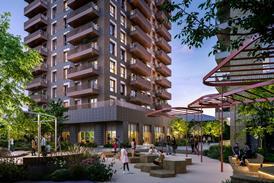The budget didn’t deliver big money for new housing but a raft of small measures to stimulate housing supply. Will it help asks Thomas Lane

The chancellor had a difficult balancing act to perform with the budget. He needed to come up with something to quell public dissatisfaction over austerity and the high costs of housing against a background of weaker than expected productivity and a deficit that is stubbornly refusing to go away.
Unsurprisingly much of the budget was calculated to avoid rocking any boats, fuel and booze duty frozen, some extra money for the NHS and an increase in vehicle excise duty that won’t actually affect anyone who already owns a diesel car.
Hammond’s headline was first-time buyers won’t pay stamp duty on purchases up to £300,000. The reality is this won’t make much difference as the demand for homes is so great prices will simply adjust to compensate for lower transaction costs. This happened with help to buy; a bonanza for the major housebuilders which inflated house prices and their share prices.
The interesting part of the budget was the drop in the share prices of those same housebuilders during Hammond’s speech. Instead of a hoped-for announcement of big increases in government spending on housing – of the headline £44bn figure only £15.3bn is new money – Hammond unveiled a series of measures that for the first time in years started to roll back the power of the big housebuilders.
The first was the announcement that overseas investors will pay capital gains tax from 2019 on property disposals. Given the new build London property market is fuelled by overseas money this could have a big impact on the desirability of buying a luxury flat as an investment which in turn could affect developers and their supply chains.
The second was the announcement of a review into the gap between the number of planning permissions granted and homes actually built, presumably to get to the bottom of whether big housebuilders are guilty of building out schemes at glacial speed to keep prices up.
The third was more money to help small builders deliver homes including an extra £1.5bn for the Home Building Fund which is targeted at SMEs who can’t raise finance and £630m to accelerate house building on small, stalled sites by funding land remediation and onsite infrastructure. Local authorities must now bring forward 20% of their housing supply as small sites. Good news for smaller architects.
Other measures designed to increase housing supply included a consultation announcement on changes to planning rules, including setting minimum housing densities in city centres and near transport hubs. This also includes allowing office buildings to be demolished under permitted development rights if the land is being redeveloped for homes.
There was a modest injection of cash into delivery of social housing. The announcement of an extra £2bn for affordable housing including socially rented homes was confirmed. The cap on local authorities borrowing to build social housing will be lifted so they will be able to borrow an extra £1bn from 2019-20 to be spent over two years.
This budget wasn’t the spending binge some were hoping for, and more money to tackle the housing crisis could easily have been justified. But given the constraints Hammond is under it is a small step in the right direction.
















No comments yet